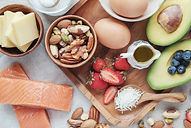
FOOD AS MEDICINE
Disclaimer: I am not a qualified health practitioner. You should always consult a qualified health practitioner if you are sick. Opinions expressed on this website are my own or come from my own experience or research



Can food really be used as medicine? I firmly believe that it can.

I have glaucoma which means that I have high pressure in my eyes caused by poor fluid drainage. If this is not managed, people with glaucoma will go blind.
My Father went blind from glaucoma in his 80s even though it was being managed….
Hence, every night, I put drops in my eyes to keep the pressures in both my eyes under control.
Last November (it is now July 2022), I went for a check-up. My eye pressures were 19 and 21.
According to the Glaucoma Research Foundation, anything that exceeds 21 is considered ‘hypertensive’. This means that the pressure in the eyes is pressing the optic nerve and over time will cause damage to the optic nerve and permanent vision loss.
As you can imagine, I was concerned. My eye pressures had been around 15-17 for quite a few years. Why had they gone up? I suspect a not so healthy Covid lockdown diet with the family for a couple of years….. too many cookies, cocktails, cakes, online cooking courses etc…
I knew what I had to do.
A number of years ago, I had my eye check-up just after completing a couple of months of a raw food diet. My pressures were the lowest I had ever seen.
Time to clean up my act and do it again.
So, for 2-3 months, my husband and I followed a broadly raw food diet (about 75%). I then went for my eye check-up at the hospital. My pressures had dropped to 14 and 15 – the lowest I have ever been able to get them.
I do still put drops in my eyes but the pressures are now back under control and no further treatment is needed. Further treatment would entail a 2nd or even 3rd set of drops and eventually even surgery. I would rather not go down that path.
Eating a super healthy diet can improve many conditions, not just glaucoma. If you have read my Home Page/About Me, you will know that a number of years ago, many of my husband’s blood test results were all border line following a general medical check-up in his mid 50s ie the results were sitting on the edge of acceptable. His doctor was concerned that they were heading for the red zone. Having followed a raw food diet for 2 months along with some targeted supplementation under the care of a qualified natural health practitioner , the tests were run again and the markers were all solidly back in the green. Our GP was impressed.
The Raw Food Diet




So, before you panic..... what does a raw food diet look like?

Breakfast
Home-made smoothie, Bircher Muesli, home-made nut and seed granola.

Lunch
Soup, both raw and cooked. All sorts of salads - both western and asian. Home-made dips with veggie sticks, flax crackers.

Dinner
Cooked vegetarian dish or poached chicken or fish with a home-made raw sauce and lightly steamed vegetables

Dessert
Yes, there’s dessert – raw pecan pie, raw apple pie, strawberry cheesecake, ice kream and more

Snacks
Yes, those too! Nuts, dips, sweet treats such as date and nut balls, bars, home- made raw organic chocolate etc
Strictly speaking, wheat and dairy are not on the diet but we do eat my husband’s organic home- made wholewheat bread (see the recipe section) from time to time, as well as a little plain organic kefir yoghurt. So, avocado or tomatoes on toast (with olive oil and little Himalayan salt) are on the menu and I use organic kefir yoghurt as a change from coconut youghurt with home-made muesli or in a dip. We also do not drink alcohol and restrict coffee and tea while following a raw food plan – sorry about that…. Herbal teas are fine.
I bought these books when we first did a raw food diet years ago in Singapore and I continue to use them and somehow find new recipes in them every time we decide we need some raw food in our lives. However, I am sure there will be plenty more books on raw food available now. Also look up the Raw Chef if you are interested.
And just so you know, I do not own a dehydrator and the only thing I dehydrate are flax seeds to make some flax crackers - but I do that in the oven. When we first did a raw food diet years ago, I did not soak nuts but I do try to remember to do it now.




Plant Based Eating
You may feel, of course, that a raw food diet is a step too far for you and whilst I eat a lot of raw food in my day-to-day diet, I do not follow this plan rigidly throughout the year. I use it for 2-3 months when I need to reset and restore my body. We try to do it once a year but for various reasons, it doesn’t always happen. I do wonder what health I could achieve if I did follow it on a more permanent basis but inevitably, the wheels tend to fall off…
1. Eat More, Live Well by Dr Megan Rossi

There are many ways to skin a cat as they say and hence, I would like to recommend this book, Eat More, Live Well, as a super healthy, but very ‘doable’, eating plan.
If you have a more serious condition and you need a more targeted approach, you could then consider the Raw Food diet or the Younger You plan which I will discuss below. But I think Eat More, Live Well actually goes a long way to make a serious impact on health without being difficult to follow. Recipes are quick to assemble and ingredients are readily available in the supermarket.
Who is Dr Megan Rossi?
She is known as The Gut Health Doctor and is considered one of the most influential gut health specialists internationally. She has practiced as a Dietician and Nutritionist for the last decade and has an award-winning PhD in gut health.
Dr Rossi founded the Gut Health Clinic in London and is a member of the IBS Network Expert Advisory Board and Bowel and Cancer Research UK Research Grants Committee.
This book is about eating a plant-based diet. Note plant ‘based’. You can absolutely eat meat, fish, dairy, honey, eggs but equally it is suitable for both vegans and vegetarians. It’s flexible.
But the most important point is to get loads of plants in your body – a lot more than just 1 or 2 veg with your dinner. However, it’s not only about eating more plants but about the variety of plants that you eat.
Why is variety important?

Of course, the broader the variety of plants, the broader the range of vitamins, nutrients, fats and fibre your body will be getting but also, and of equal importance, the happier and more varied your gut microbes will be.
And as you may know from reading this website, your gut health, and the health and diversity of the microbes that live there, is absolutely essential to your overall health.


Gut health is said to be responsible for 80% of your immune system and is important for mental health, hormone health and linked with circadian rhythms (sleep), weight management, cholesterol and even blood pressure. For more information, please read my article
Have The Guts to Heal Your Guts
And if you have any gut issues at all or an auto immune condition, please also read my page
Dr Rossi states that upping fibre by just 8 grams a day is linked with a reduced risk of heart disease, type 2 diabetes, colon cancer and death from all causes. Surely, that’s a good enough reason to hit the fruit and veg aisle at the supermarket?
This is a very approachable book. This first half is informative; an easy read about gut health, the benefits of plant-based eating and how to get started. The second half is recipes and there are recipes for busy people, for the family and for people with food sensitivities. I have found the recipes to be delicious and straightforward.
2. Younger You by Dr Kara Fitzgerald

Dr Kara Fitzgerald is a world-renowned doctor, scientist and functional medical practitioner based in the US.
Functional medicine is a systematic science-based approach to identifying, understanding, and resolving the root causes of chronic health conditions. There may be many causes to a medical condition eg depression and equally one cause, eg inflammation for many conditions. Physical and mental health along with lifestyle and environment are all investigated. The foundation of functional medicine is the use of food as a first line therapy combined with lifestyle and behavioural interventions.
A Groundbreaking Trial
Dr Fitzgerald is the lead author on a ground-breaking, rigorous clinical pilot trial that asked participants to

Eat plenty of delicous food

Get 7 hours of sleep a night

Practice 10 minutes of relaxation twice a day
The participants were to do this for 8 weeks and their biological age was measured both before and after the trial period.

The Results Blew The Doors Off!
Study participants lowered their biological age by an average of 3.23 years compared to the control group who received no intervention.
In other words they were biologically 3.23 years younger than before the study.

Clearly, it’s exciting to think of being able to be biologically younger, but what are the implications for our health?
I’m going to get a bit technical here but stay with me because it’s important. I’m going to talk about epigenetics. Epigenetics is the ability to turn genes on and off or, at least, dial them up and dial them down.


Yes, some things are set at birth by your genes such as eye colour, hair colour, height etc. And we thought that was the case for everything – that we are stuck with what our genes dictate at birth.
Well, it turns out that this is not quite true. According to Dr Fitzgerald, we can, indeed, influence our genes and particularly those connected to our health.
But first, to quote from the book, here are some statistics from the US for you to think about:
-
80% of adults over 65 have one chronic disease and 77% have at least 2 (when I went for my eye check up at the hospital, at the age of 62, the nurse was surprised that I was not taking any medication…)
-
1 in 3 under 65 have metabolic syndrome which includes high blood pressure, high blood sugar, high cholesterol, high triglycerides and belly fat. These conditions pave the way to chronic disease
-
Life expectancy in the US declined for 3 straight years from 2015 – 2017. It is the longest decline since the period 1915-1918 which covered Word War 1 and the Spanish flu which killed millions
-
According to the World Health Organization (WHO), we spend 20% of our lives sick
-
Apparently, most people can look forward to a long, slow, gradual decline in quality of life for about 16 years
And finally….
-
In 2000 the US health care spending was $1.4 trillion
-
In 2019 the US health care spending was $3.8 trillion
Food for thought. Food being the operative word.
But it doesn’t have to be like this.
So, how do we change this picture? Epigenetics suggests that we can reduce the risk of all diseases and conditions at once by maintaining or reducing Biological Age. And how do you reduce Biological Age? You do it through diet and lifestyle.
DNA Methylation
DNA methylation is the operating system of your body. It tells your hardware, your genes, what to do.
It determines what genes are switched on and off and to what extent. And, according to Dr Fitzgerald, you have tremendous influence over this process through diet and lifestyle.
Methylation is happening in every cell in your body all the time. It’s as important as breathing and controls all the millions of processes in your body.
Methyl groups are moved on and off genes, switching them on and off.

When methyl groups are removed, the volume of a gene is turned up
When methyl groups are added, the volume of a gene is turned down
.The 8 week Younger You diet indicates that DNA methylation is influenced by diet and lifestyle.
Unfortunately, methylation slows down and becomes imbalanced as we age, and this can be measured by levels of homocysteine. If levels are elevated, then methylation is impaired.
This is associated with an increased risk of cardiovascular disease and neurological disease eg alzheimers.

Since prescribing her 8-week diet to hundreds of patients in her clinic, this is what Dr Fitzgerald has seen:
-
Reduction in Triglycerides
-
Reduction in Cholesterol
-
Improved energy
-
Reduced anxiety, improved mood
-
Increase in circulating methyl folate which is a key player in DNA methylation
-
Weight loss
-
Lowered inflammation
-
Fewer headaches
-
Improved gastrointestinal health
-
Improved methylation markers
-
Homocysteine levels
-
B12 + folate
-
This was achieved through diet alone with no supplementation or prescriptions. However, there are cases where deficiencies may need to be addressed with supplementation but that is carefully managed through testing, administered in the short term and under the supervision of a qualified practitioner.
Eating a broad, plant based, healthy diet should provide you with all the vitamins you need unless you are severely deficient.


However, I personally believe that supplementation with plant-based minerals is also essential to good health.
This is because in the year 2000, figures from the Department of Environment, Food and Rural Affairs in the UK showed that trace minerals in the UK fruit and vegetables had fallen by 76%. Similar Figures from the US Department of Agriculture indicated this wasn’t just a British problem. This has serious implications for health. Please read my article below –




Research now indicates that you are affecting/changing your epigenome every day by all the choices you make - food, exercise, sleep, environmental factors such as toxins, chemicals.
Even touch, such as cuddles, affects DNA methylation.




Poor life choices such as processed food, stress, poor sleep, no exercise, alcohol, toxic exposure results in
-
Impaired methylation
-
Accelerated aging
-
Disease
-
Bad genes switched on eg cancer, diabetes
-
Good genes switched off eg tumour suppression, detoxification, anti-inflammation genes
According to Dr Fitzgerald, disregulated methylation has been established in:
Obesity
Alzheimer’s Disease (95% of Alzheimer patients have the non-genetic form ie epigenetics dictates the vast majority of cases)
Heart Disease
Type 2 Diabetes
Depression
Auto Immune Disease and Allergies
Cancer
Dr Fitzgerald maintains that good choices over the long-term results in long lasting positive genetic changes which can lower your biological age and have a positive impact on your health and quality of life.
If you have a challenging or chronic health issue, I would recommend investigating Dr Fitzgerald’s 8 week Younger You diet followed by her Maintenance diet or the Eat More, Live Well diet and consulting a qualified naturopath/functional medical practitioner.
The Food Combining Diet


I cleared my lifelong eczema in my late 20s by following the Food Combining/Hay diet. And my Father cleared the arthritis in his knees. A friend in Singapore had bad arthritis and whilst the diet did not clear it, the diet made such a difference to her pain and discomfort that she told me that she would follow it for the rest of her life.
I do not follow the food combining diet now, although my diet naturally tends that way, but my eczema has never returned. My Dad eventually reverted to his previous eating and drinking habits and his arthritis returned. He would then go back to the Food Combining diet from time to time to alleviate discomfort and lose some weight!
Essentially you do not eat carbohydrates and protein or acid and alkali foods at the same meal.
As I have already written about this diet in the Health Issues section of this website, here is the link if you have not already read about it and are interested to do so.
The Budwig Diet

Dr Joanna Budwig
The Budwig Diet is a central part of treatment at the Budwig Center in Malaga, Spain. The Budwig Center treats people with cancer and other chronic diseases.
The last time I visited the Budwig Center, I met a lady who had been diagnosed with breast cancer 17 years previously. She credits the Budwig Center and their approach to treating her breast cancer for her general good health, longevity and vitality.
The Budwig diet was developed by Dr Joanna Budwig, an insightful clinician with a passion for developing an evidence-based, natural, and effective approach to health.
Her research into essential fatty acids and the impact of diet and holistic health on disease progression and prevention has inspired the works of conventional medics and naturopaths alike.
This diet is essentially vegetarian and focuses on eating natural, fresh food, particularly nutritious organic fruits and vegetables and cutting out refined sugars, processed food, dairy, alcohol and reducing wheat and animal proteins.
In addition, there are some specific recipes that Dr Budwig developed to help attain peak nourishment and fight pre-existing diseases.




The most important of these was her ‘Budwig Muesli’, a meal centred around flaxseeds, flaxseed oil and quark (a sort of soft cheese). This is a carefully planned mix of essential fatty acids that Dr Budwig found could prevent, inhibit and actually reverse cancer growth in many of her patients. Dr Budwig had great success with this mix and recommended it for everyone, not just cancer patients.
Along with the diet, being physically active as well as stretching daily is also an important component of the Budwig Diet along with avoiding toxins, chemicals, managing stress, sleep etc.
The Budwig Center will assess your health status and address imbalances and deficiencies along with other natural and wholistic treatments beneficial to chronic illnesses.
For more information go to www.budwigcenter.com where you can download a free Budwig guide outlining the diet, more information on Joanna Budwig, the Budwig Muesli and the Center’s approach to health.
The Mediterranean Diet






I expect a number of you will be thinking, “Well, what about the Mediterranean Diet?”
The Mediterranean Diet is well-researched and has also recently been shown to reduce biological age in a specific population. It is a good, general eating plan that has shown health benefits.
However, the Mediterranean Diet provides more modest gains over a longer period of time. For more chronic or serious health issues, the Younger You programme, raw food diet or Budwig diet would be worth investigating.
Here is a link explaining more about the Mediterranean diet and how to get started.
In Conclusion
We really are what we eat. What we do and don't put into or onto our bodies has a significant impact on our health as I have personally experienced.
There are other things that are important too, of course, such as managing stress, sleep, exercise etc but the foundation for good health has to be, in my opinion, good nutrition and a healthy gut.
I hope this article shows what can be done for health through good nutrition and inspires and gives you the tools to make a positive impact on your health, energy, vitality and Zest for Life!


